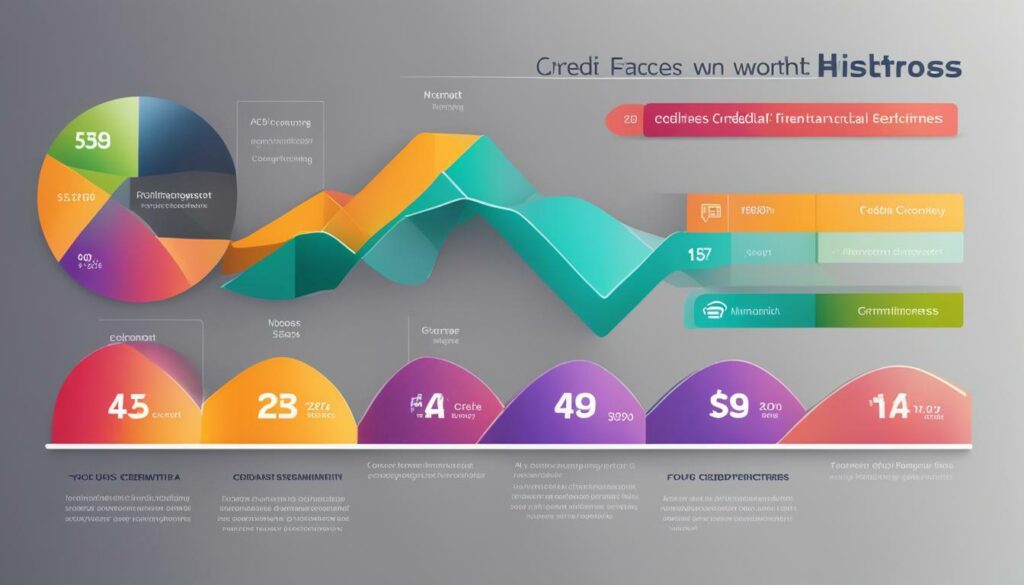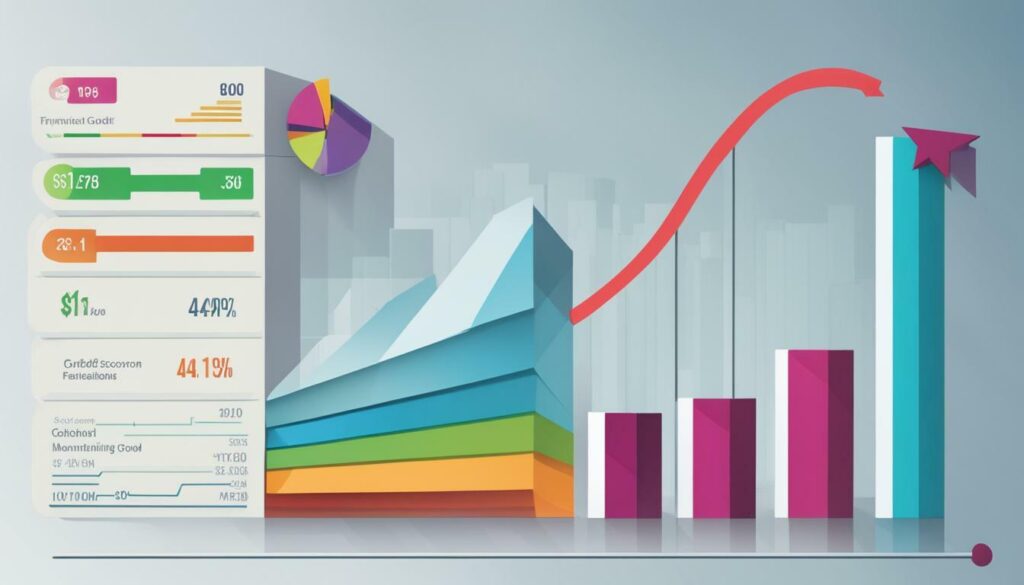Unlocking the Secrets: Understanding the Factors that Determine Creditworthiness

Creditworthiness is a crucial measure of a borrower’s reliability in meeting their debt obligations and is determined by various factors. When lenders assess your creditworthiness, they consider factors such as your repayment history and credit score. These indicators provide insight into your ability to manage and repay borrowed funds. Understanding the factors that determine creditworthiness is essential for individuals seeking financial stability and opportunities.
- Repayment history and credit score greatly influence creditworthiness.
- A positive credit history can lead to better interest rates and increased chances of loan approval.
- Good creditworthiness improves employment eligibility and can result in lower insurance premiums.
- To maintain and improve creditworthiness, it is important to pay bills on time, reduce debt, and monitor credit utilization ratio.
- Resources such as books on creditworthiness improvement offer valuable strategies and insights.
Understanding the factors that determine creditworthiness empowers you to make informed financial decisions. By actively managing your credit and seeking resources to improve your creditworthiness, you can strengthen your financial position and open doors to new opportunities.
Repayment History and Credit Score: Key Creditworthiness Factors
Your repayment history and credit score play a vital role in determining your creditworthiness and lenders’ trust in your ability to honor your financial obligations. A strong repayment history reflects your past behavior in repaying loans and managing credit, while your credit score is a numerical representation of your overall creditworthiness. Let’s take a closer look at these two crucial factors.
Repayment History: Your repayment history is a record of how you have managed your debts in the past. It includes information about your payment patterns, such as whether you have made payments on time, missed any payments, or defaulted on any loans. Lenders view a consistent and timely payment history as a positive indication of your creditworthiness. On the other hand, a history of missed or late payments may raise concerns about your ability to manage future debt obligations.
Credit Score: Your credit score is a three-digit number that summarizes your creditworthiness. It is calculated using various factors, including your repayment history, the amount of debt you owe, the length of your credit history, the types of credit you have, and any recent credit inquiries. A higher credit score indicates a lower risk to lenders, making it easier for you to secure loans and obtain favorable interest rates. Alternatively, a lower credit score may limit your borrowing options or result in higher interest rates.
🚨 TUIC Errors + Low Credit Score?
CreditScoreIQ helps you build credit faster by reporting utility bills to all 3 bureaus—while you dispute errors.
Start Building Credit Today →Understanding the Factors Impacting Your Credit Score
Several factors can influence your credit score, and it is important to understand how they contribute to your overall creditworthiness. Here are some key components:
| Factor | Description |
|---|---|
| Payment History | Consistent and timely payments positively impact your credit score, while missed or late payments can have a negative effect. |
| Credit Utilization | The percentage of available credit you are using. Keeping your credit utilization low can boost your credit score. |
| Length of Credit History | A longer credit history demonstrates your ability to manage credit over time, which can enhance your creditworthiness. |
| Credit Mix | Holding a diverse mix of credit types, such as credit cards, loans, and mortgages, can demonstrate responsible credit management. |
| New Credit Inquiries | Applying for excessive credit within a short period may negatively impact your credit score. Only apply for credit when necessary. |
By understanding the factors that impact your credit score, you can take proactive steps to maintain a positive repayment history and improve your overall creditworthiness. Regularly checking your credit report, paying bills on time, and reducing your debt can help you build and maintain a strong credit profile.

A strong creditworthiness opens a world of benefits and opportunities, from more favorable interest rates to increased employability and financial flexibility. Having a good creditworthiness means that lenders and financial institutions view you as a reliable borrower, which can greatly impact your financial well-being.
One of the key benefits of good creditworthiness is the ability to secure loans and credit at lower interest rates. Lenders are more willing to offer competitive rates to individuals with a proven track record of responsible borrowing and timely repayment. This can result in significant savings over time, whether you’re applying for a mortgage, car loan, or credit card.
Furthermore, good creditworthiness can open doors to employment opportunities. Many employers conduct credit checks as part of their hiring process, particularly for positions that involve handling finances or sensitive information. A positive credit history demonstrates financial responsibility and can give you an edge over other candidates.
| Benefits of Good Creditworthiness: | Opportunities with Good Creditworthiness: |
|---|---|
| Access to lower interest rates | Increased chances of loan approval |
| Higher credit limits | Employment eligibility |
| Lower insurance premiums | Financial flexibility |
Having a good creditworthiness means that lenders and financial institutions view you as a reliable borrower.
Improving and maintaining your creditworthiness requires proactive effort and responsible financial management. It’s essential to pay bills on time, as payment history is a significant factor in determining creditworthiness. Additionally, reducing debt and keeping credit utilization low can positively impact your credit score and overall creditworthiness.
Regularly reviewing your credit report is another important step in managing your creditworthiness. By checking for inaccuracies or discrepancies, you can address any issues promptly and maintain an accurate representation of your credit history.
Resources for Creditworthiness Improvement
If you’re looking for guidance on improving your creditworthiness, there are a variety of resources available. Books such as “The 800 Blueprint” by Anthony Daniels, “Credit Secrets: 3 in 1” by Neil Hack, and “Repair Your Credit Like the Pros” by Carolyn Warren offer valuable strategies and insights to help you enhance your creditworthiness and manage credit effectively.

“Personal Finance Made Easy for Young Adults” by Dakota McQueen is also an excellent resource for young individuals seeking to understand personal finance and build creditworthiness from an early age.
In conclusion, creditworthiness plays a vital role in financial well-being. By maintaining a good creditworthiness, you can enjoy the benefits of lower interest rates, increased employability, and more financial opportunities. Take proactive steps to improve and manage your creditworthiness, and leverage available resources to guide you on your journey to financial success.
Maintaining and Improving Creditworthiness
Taking proactive steps to maintain and improve your creditworthiness is crucial for a solid financial foundation. Your creditworthiness is a measure of how likely you are to default on your debt obligations, and it plays a significant role in determining your financial opportunities. By understanding the factors that determine creditworthiness and implementing smart financial practices, you can enhance your creditworthiness and open doors to better interest rates, increased chances of loan approval, and other benefits.
Here are some key strategies to help you maintain and improve your creditworthiness:
- Pay your bills on time: Consistently making on-time payments is one of the most important factors in maintaining good creditworthiness. Late payments can negatively impact your credit score and raise concerns for lenders.
- Reduce your debt: High levels of debt can signal financial instability and lower your creditworthiness. Aim to pay down your debts and keep your credit utilization ratio low.
- Monitor your credit utilization ratio: Your credit utilization ratio is the amount of credit you are currently using compared to your total available credit. Keeping this ratio below 30% demonstrates responsible credit management and can positively impact your creditworthiness.
- Regularly review your credit reports: Check your credit reports at least once a year to ensure their accuracy. Discrepancies or errors on your credit reports can harm your creditworthiness, so it’s important to address them promptly.
Remember, building and maintaining creditworthiness is an ongoing process that requires diligence and responsible financial management. By following these strategies and staying informed about your credit, you can proactively improve your creditworthiness and set yourself up for financial success.
Table: Key Factors for Maintaining and Improving Creditworthiness
| Key Factors | Description |
|---|---|
| Timely Payments | Paying your bills on time demonstrates reliability and responsible financial behavior. |
| Debt Reduction | Reducing your overall debt burden improves your creditworthiness. |
| Credit Utilization Ratio | Keeping your credit utilization ratio below 30% shows responsible credit management. |
| Regular Credit Report Review | Monitoring your credit reports helps identify and address any errors or discrepancies. |
By taking control of your financial habits and making conscious efforts to maintain and improve your creditworthiness, you can unlock greater financial opportunities and pave the way for a more secure and prosperous future.

A wealth of knowledge lies within books dedicated to improving creditworthiness, offering valuable tips and advice to help you navigate the complexities of credit management. Whether you’re looking to understand the factors that determine creditworthiness or seeking strategies to boost your credit score, these books offer actionable insights to help you achieve your financial goals.
One highly recommended book is The 800 Blueprint by Anthony Daniels. This comprehensive guide dives deep into the world of creditworthiness, providing readers with a step-by-step roadmap to achieve an excellent credit score. From understanding credit reports to implementing effective credit-building strategies, this book is a valuable resource for those seeking to improve their creditworthiness.
Another must-read is Credit Secrets: 3 in 1 by Neil Hack. This book offers a combination of strategies, tips, and real-life examples to help readers conquer their credit challenges. It covers a wide range of topics, including debt management, dispute tactics, and credit repair, making it an indispensable tool for anyone looking to enhance their creditworthiness.
If you’re seeking a comprehensive guide to credit repair, Repair Your Credit Like the Pros by Carolyn Warren is an excellent choice. This book provides practical advice on improving credit scores, disputing inaccuracies, and negotiating with creditors. It empowers readers to take control of their creditworthiness and offers insights from experienced professionals in the industry.
Why Books Matter
“Books are a uniquely portable magic.” – Stephen King
Books are not merely a source of information; they hold the power to transform lives. By investing time in reading books dedicated to improving creditworthiness, you are taking proactive steps towards financial success and a stronger credit profile.
Remember, knowledge is the key to unlocking a better financial future. So why not leverage the wisdom shared by experts in the field to improve your creditworthiness and secure a brighter tomorrow?

| Book Title | Author |
|---|---|
| The 800 Blueprint | Anthony Daniels |
| Credit Secrets: 3 in 1 | Neil Hack |
| Repair Your Credit Like the Pros | Carolyn Warren |
Personal Finance and Creditworthiness for Young Adults
Developing a strong foundation in personal finance is key for young adults to build creditworthiness and set themselves up for a successful financial future. Understanding how to manage money responsibly and make informed financial decisions is crucial in today’s society.
One of the first steps in establishing creditworthiness is to open a bank account. This allows young adults to start building a positive financial history and demonstrate their ability to handle money responsibly. It also provides a platform for managing expenses, setting financial goals, and tracking spending habits.
Creating a budget is another essential aspect of personal finance for young adults. By carefully planning and allocating income, they can ensure that their expenses are in line with their earnings. This helps avoid overspending, accumulating debt, and negatively impacting creditworthiness. Tools like budgeting apps or spreadsheets can be used to track expenses, set savings goals, and analyze spending patterns.
Furthermore, understanding the basics of credit is crucial. Young adults should familiarize themselves with credit reports, credit scores, and how they impact creditworthiness. Regularly checking their credit reports for accuracy is essential to identify any errors or fraudulent activity. Additionally, they should aim to maintain a good credit score by paying bills on time, keeping credit utilization low, and avoiding excessive debt.
Recommended Resources:
- 1. “The 800 Blueprint” by Anthony Daniels – This book offers practical strategies for improving creditworthiness, raising credit scores, and managing credit effectively.
- 2. “Credit Secrets: 3 in 1” by Neil Hack – This comprehensive guide provides insights into credit repair, debt management, and how to navigate the credit system.
- 3. “Repair Your Credit Like the Pros” by Carolyn Warren – This book offers step-by-step guidance on repairing credit, boosting credit scores, and dealing with credit bureaus.
By equipping themselves with knowledge and taking proactive steps to manage their finances responsibly, young adults can build and maintain strong creditworthiness. This not only opens the doors to various financial opportunities but also lays the foundation for a stable and secure financial future.

Understanding the factors that determine creditworthiness is crucial for managing your financial health and seizing opportunities for growth and stability. Creditworthiness is a measure of how likely a borrower is to default on their debt obligations, and it is influenced by multiple factors.
Two key factors that heavily impact creditworthiness are repayment history and credit score. Maintaining a good repayment history, characterized by consistently paying bills on time, demonstrates your reliability as a borrower. Your credit score, computed based on various factors including credit utilization and payment history, provides lenders with a snapshot of your creditworthiness.
A positive creditworthiness can unlock numerous benefits and opportunities. For instance, individuals with good creditworthiness are more likely to secure better interest rates on loans and credit cards. They may also enjoy increased chances of loan approval, employment eligibility, and lower insurance premiums. A strong creditworthiness establishes trustworthiness and credibility in the eyes of financial institutions.
To maintain and improve your creditworthiness, it is essential to adopt sound financial practices. This includes paying bills on time, reducing debt, and monitoring your credit utilization ratio. Regularly reviewing your credit reports for accuracy is also crucial, as errors can negatively impact your creditworthiness. By consistently managing your finances and taking proactive steps, you can strengthen your creditworthiness and secure a solid financial foundation.
Fortunately, there are resources available to guide you on your creditworthiness journey. Books such as “The 800 Blueprint” by Anthony Daniels, “Credit Secrets: 3 in 1” by Neil Hack, and “Repair Your Credit Like the Pros” by Carolyn Warren offer practical strategies and insights for improving creditworthiness and effectively managing credit. For young adults seeking to understand personal finance and build creditworthiness, “Personal Finance Made Easy for Young Adults” by Dakota McQueen serves as a valuable guide.
In conclusion, understanding and actively managing the factors that determine creditworthiness is crucial for achieving a strong financial position. By taking control of your creditworthiness, you can open doors to better interest rates, increased opportunities, and a stable financial future.
FAQ
Q: What is creditworthiness?
A: Creditworthiness is a measure of how likely a borrower is to default on their debt obligations.
Q: How is creditworthiness determined?
A: Creditworthiness is determined by factors such as repayment history and credit score.
Q: What are the benefits of having good creditworthiness?
A: Good creditworthiness can lead to better interest rates, employment eligibility, and other financial opportunities.
Q: How can I improve my creditworthiness?
A: Steps to improve creditworthiness include paying bills on time, reducing debt, and monitoring credit utilization ratio.
Q: Are there any resources available to help improve creditworthiness?
A: Yes, books such as “The 800 Blueprint” by Anthony Daniels, “Credit Secrets: 3 in 1” by Neil Hack, and “Repair Your Credit Like the Pros” by Carolyn Warren provide strategies for improving creditworthiness.
Q: Is there a guide specifically for young adults to understand personal finance and build creditworthiness?
A: Yes, “Personal Finance Made Easy for Young Adults” by Dakota McQueen is a useful guide for young individuals looking to understand personal finance and build creditworthiness.
Ready to Improve Your Credit?
Disputing TUIC errors is step one. Step two? Boost your score by reporting utility payments with CreditScoreIQ.
Get Started Now (Only $1 Trial) →3-bureau reporting • $1M identity insurance • Dark web monitoring






